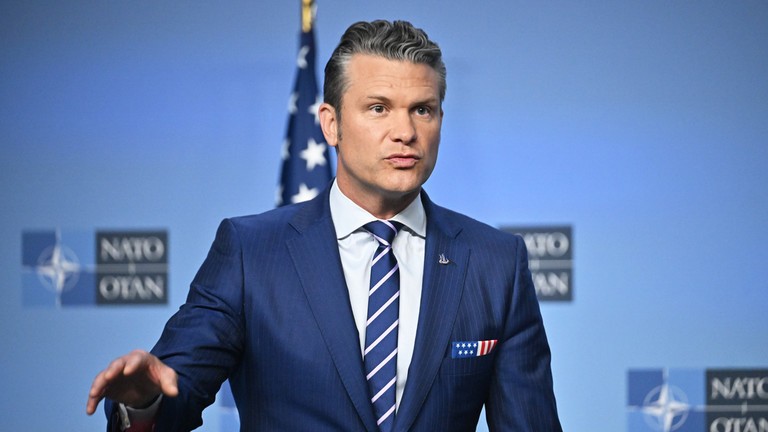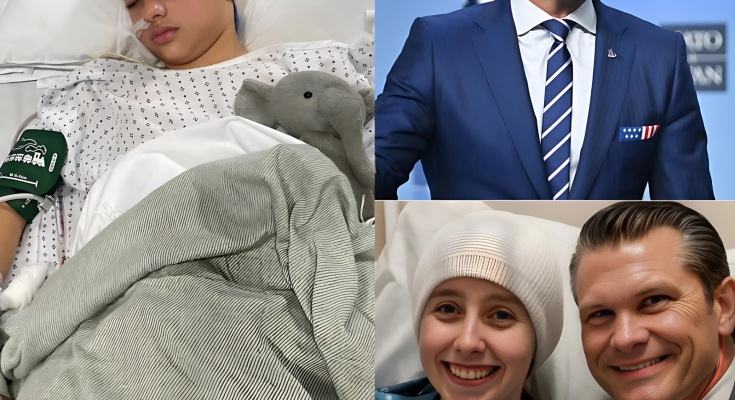In a world often dominated by headlines of controversy, political rivalry, and sensationalized media coverage, a story of quiet heroism has emerged, shedding light on the unheralded acts of compassion that sometimes go unnoticed behind the glare of the public eye. Pete Hegseth, a figure widely known for his political commentary and media presence, has quietly stepped into the most human of roles: that of a benefactor who changed a child’s life in the most literal sense.

The story came to public attention only recently, when a hospital in the Midwest issued a statement detailing Hegseth’s generous actions. According to hospital officials, Hegseth personally funded the life-saving surgery of a 9-year-old girl diagnosed with a brain tumor. The announcement revealed that this act of charity had taken place months earlier, but had been kept entirely private at Hegseth’s request. This revelation stunned the community, fans, and even those who follow him for his media appearances, highlighting a side of public figures that rarely makes headlines: humility and selfless generosity.
The young girl, whose family asked to remain anonymous to protect their privacy, had been struggling with a serious medical condition that required immediate and complex surgical intervention. Brain tumors in pediatric patients are notoriously difficult to treat, often involving high-risk procedures and long, painstaking recovery periods. The family, overwhelmed by mounting medical bills and the emotional weight of their daughter’s illness, had feared that a timely surgery might be out of reach. That’s when Hegseth’s intervention became life-altering.
Hospital administrators described Hegseth’s contribution not as a publicity stunt but as a discreet act of compassion. “He reached out quietly and ensured that the surgery could happen immediately,” a spokesperson said. “There were no cameras, no fanfare — just a clear focus on giving a child a chance at life.” According to insiders, Hegseth coordinated directly with the hospital’s financial office and the family to cover the cost of the operation, including preoperative care, the surgical procedure itself, and the necessary post-operative treatment to ensure a full recovery.
While Hegseth is often in the public eye for his commentary on politics and national issues, this story presents a stark contrast to the persona many associate with him. It reminds the public that behind media personalities and political figures are human beings capable of extraordinary empathy and courage. In an era where public figures are frequently criticized, scrutinized, and vilified for their words and actions, stories like this stand out as poignant reminders of the good that can go unnoticed.

Social media reactions to the revelation have been swift and overwhelmingly positive. Fans, commentators, and even some political opponents praised Hegseth for his discreet intervention. The hashtag #HegsethHero began trending within hours of the hospital’s announcement, as people shared messages of admiration and support. Many users noted that, in a climate of cynicism and partisanship, such acts of genuine human kindness can transcend politics and remind communities of the power of personal responsibility and compassion.
Experts in pediatric healthcare also weighed in, emphasizing the impact of timely financial support in critical medical cases. Dr. Sarah Mitchell, a pediatric neurosurgeon unaffiliated with the case, commented, “Brain tumor surgeries for children are not only medically complex but financially overwhelming for most families. Philanthropic actions like this one do not just pay for a procedure — they change the trajectory of a child’s entire life and that of her family. The long-term benefits are immeasurable.”
Beyond the immediate surgical intervention, Hegseth’s contribution also underscores the broader issue of accessibility to healthcare, particularly for families facing catastrophic medical expenses. While some view the intervention as a one-time act, it draws attention to systemic challenges that many families encounter. In a nation where healthcare costs can dictate life-and-death outcomes, private acts of philanthropy, though not a substitute for systemic reform, can nevertheless be transformative.

For the family involved, the gratitude is immeasurable. Speaking through the hospital, the mother said, “We are beyond thankful. We cannot express how much this has meant to us. It’s hard to find the words for what someone like Mr. Hegseth has done. He didn’t need recognition; he didn’t ask for anything. He just gave our daughter a chance to grow up, to dream, and to live.” The father echoed these sentiments, emphasizing that this act has given the family hope and a renewed belief in the inherent goodness that still exists in the world.
The hospital noted that Hegseth’s quiet approach was intentional, designed to protect the young patient from public scrutiny and media intrusion. This decision demonstrates a rare understanding of the vulnerability of those receiving aid. In many high-profile cases, public figures may seek to highlight their philanthropy for social capital or publicity. Hegseth, however, ensured that the focus remained solely on the patient and her well-being, illustrating a form of altruism that is increasingly uncommon in public life.
While much of Hegseth’s public persona revolves around spirited debate and commentary on controversial issues, this story provides a more nuanced understanding of him. It challenges the public to reconsider how they view individuals in the media spotlight and reminds audiences that acts of kindness often happen in private, unseen by millions, yet can leave an indelible impact on the lives of those touched.
Health professionals stress that stories like these can have ripple effects, inspiring others in positions of influence to contribute meaningfully to their communities. Whether through financial support, advocacy, or raising awareness, the power of one individual’s decision to intervene can create a culture of compassion that encourages others to act.

The 9-year-old patient is reportedly recovering well following the surgery, with doctors expressing optimism about her long-term prognosis. While the family continues to navigate the emotional aftermath of the diagnosis and treatment, the intervention has given them a renewed sense of security and hope. Plans for ongoing care, physical therapy, and monitoring are underway, ensuring that the child’s path forward is supported comprehensively.
In the context of broader societal discourse, this story resonates far beyond the hospital walls. In a world inundated with negative news, stories of quiet heroism offer a moment of pause — a reminder that human kindness can still make a tangible difference. Hegseth’s decision to intervene, unannounced and selflessly, highlights that the most profound impact often occurs away from the public eye, without recognition, applause, or acclaim.
As news outlets continue to cover the story, the conversation has shifted to the importance of compassion and responsible action in times of crisis. Analysts and commentators alike note that while political figures are often measured by their policies and public statements, their capacity for personal acts of kindness also contributes to their legacy and the broader societal impact they leave behind.
In retrospect, Hegseth’s actions illustrate a vital lesson: heroism does not always arrive with fanfare. Sometimes, it is quiet, deliberate, and focused solely on the needs of another. In this instance, a child’s life was changed forever, a family’s despair was transformed into hope, and a public figure demonstrated that influence can be wielded for genuine, positive change.
The story of Pete Hegseth’s secret funding of a 9-year-old girl’s brain tumor surgery stands as a testament to the profound effect of human generosity. It reminds the public that even in a world dominated by scrutiny, partisanship, and public spectacle, acts of altruism continue to exist — quietly, powerfully, and with lasting impact. It is a story that will linger in the hearts of those who hear it, inspiring reflection on what each individual can do to make a difference in the lives of others.
In the end, while headlines may continue to debate political actions and media controversies, the true essence of this story is simple yet profound: one act of selfless generosity changed the course of a young girl’s life, reminding the world that heroism often arrives in the most unexpected places, at the most unexpected times, and through the most unexpected people.



